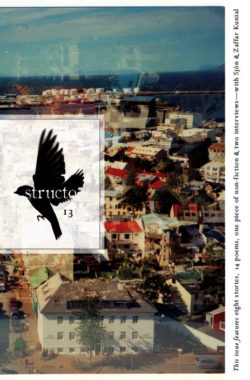Structo Magazine and Literature in Translation
Our translation competition deadline is fast approaching!
We're very proud to be working with Structo magazine to publish our competition winner, so in the run-up to the deadline, editor and designer Euan Monaghan joins us to tell us a bit more about Structo and their interest in translated literature.

Can you tell us a bit about Structo and its ethos?
Structo is a print and digital literary magazine, founded back in the mists of 2008, which publishes short stories, poetry, interviews and essays from all over the world. An issue is published every six months, and each one goes online for free three months after it's released in print. I'm very proud of what Structo has become; the quality of the writing we publish is really excellent, and our authors are a diverse bunch. We have an open submissions policy, and we read everything blind. Although the team enjoys—and we publish—a wide range of writing, we have a particular fondness for stories which falls between genre, especially slipstream fiction.
When did you start publishing translations? Has this always been something you've been interested in?
It's something we've become increasingly interested in. We published a few translations before issue eight, when our poetry editor Matthew Landrum came on-board, but given his background and interest in translation, it seemed like an obvious avenue to explore more frequently. It was one of the reasons he was such a strong choice for the role.
You tend to include poems in both the original and translation. Why do you think it's important for readers to be able to see the poem (or prose, for that matter) in its original language?
It think it's very important for poetry in particular. From the new issue, we're also including phonetic transcription of non-roman alphabets—Thai script in issue 13. I enjoy getting a sense of the changes that are made as a poem moves from one language to another, even though I don't necessarily understand the original. Sounds might become softer or harder, more or less musical; tonal emphasis might shift. It's like hearing a piece of music transcribed for a different group of instruments.
We're really grateful for your support of our translation competition. Can you tell us a bit more about your interest in contemporary Chinese writing (either from the mainland or Hong Kong)?
My interest was sparked around the same time that I began the magazine. The Southbank Centre in London hosted the China Now festival in 2008, and I think for many people in the UK this was key to discovering contemporary Chinese literature, and arts more generally. I particularly remember a couple of great stories by Zhu Wen and Yan Lianke in The Guardian, and my interest has remained with Chinese short fiction since. Late last year, Clarkesworld magazine ran a very popular crowdfunding campaign to translate and publish Chinese science-fiction. That should be fascinating.
Thank you to Euan and the Structo team, and we're looking forward to reading the winning translation in issue 14, to be published in Autumn 2015!
You can find out more about Structo on facebook and twitter.
